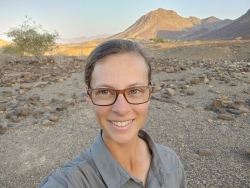
- About
- Funding
- Research
- Wright Center
- News & Events
Back to Top Nav
Back to Top Nav
Back to Top Nav
The Neukom Fellows Program launched in 2012. Fellows have two-year appointments with the option for a third year and for their interdisciplinary work which has a computational theme, are co-sponsored and mentored by faculty in at least two departments or programs. Fellows teach one course in each year of their residency. The current Neukom Fellows with their Ph.D. granting institutions and departmental affiliations are given below, along with descriptions from the Fellows of their research plans.
Anthropology and Earth Sciences; Mentors - Jesse Casana and Marisa Palucis

Paige is a landscape archaeologist specialized in remote sensing and spatial modeling methods to explore movement, mobility, and settlement patterns in past societies. Her research examines how people adapted to the challenges and opportunities of arid and mountainous landscapes and how these adaptations intersected with social and political organization. As a Neukom Fellow, Paige focuses on two key areas: pedestrian modeling and archaeological prospection. Leveraging high-performance computing, she models human and animal movement to study how people used the landscape at different times. Additionally, she employs geophysical and drone-based remote sensing technologies to uncover archaeological sites in arid regions, advancing our understanding of how ancient societies thrived in extreme environments.
Earth Sciences and Biology; Mentors - Sarah Slotznick and Olga Zhaxybayeva

Erik studies molecular phylogenetics: using gene sequences in modern organisms to understand how the genes and the organisms hosting them are related to each other, and to look backwards into their evolution. Complementing the fossil record, this genomic record especially improves our understanding of evolution in the microbial realm, which dominated the biosphere for most of Earth history. As a Neukom Fellow, Erik plans to focus on evolutionary processes governing not the survival of organisms, but their adaptations: what does it depend on whether an anatomical structure or a metabolic process survives over geological time? Microbial metabolisms are particularly interesting in this regard, as they regulate the Earth's surface environments for everyone.
Psychological and Brain Sciences and Computer Science; Mentors - Caroline Robertson, SouYoung Jin.
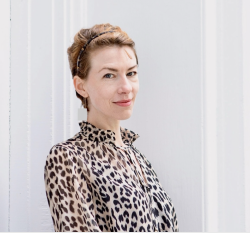
Charlotte is a cognitive neuroscientist who focuses on the relationship between organization and function in the brain, with a specific interest in neurodiversity such as autism. Her dissertation described visual activation patterns in memory-related areas. Her work also shone a light on the organizational differences between the human visual system and an artificially intelligent image classification model. As a Neukom Fellow, she will continue to employ artificial neural networks to characterize human neural activity patterns. The predictive power from these models can be leveraged to understand how memories are encoded in the brain across typical individuals and individuals with autism.
Engineering and Earth Sciences; Mentors - Klaus Keller, Erin Mayfield, and Erich Osterberg
Lynée Turek-Hankins studies equitable climate change adaptation and mitigation responses for the interconnected housing and energy sectors. Her data-driven research approach is decision-relevant and rooted in collaborations with diverse stakeholders, such as state and municipal governments and community groups. During her PhD, Lynée combined data science and co-production to identify multisector drivers of residential extreme heat risk and assess response opportunities for the housing–energy nexus. She also studied procedural justice in knowledge production and decision-making processes. Lynée is an adjunct researcher at the RAND Corporation and was a chapter author for the Fifth U.S. National Climate Assessment. As a Neukom fellow, Lynée will experiment with emerging computational causal analysis and decision science techniques to evaluate the efficacy and equity impacts of responses for the housing-energy nexus and analyze how different interventions, sources of uncertainty, and objectives influence decision making. Lynée received her PhD from the University of Miami in environmental science and policy and her B.S.E. in mechanical engineering from Stanford University.
Lynee Turek-Hankin
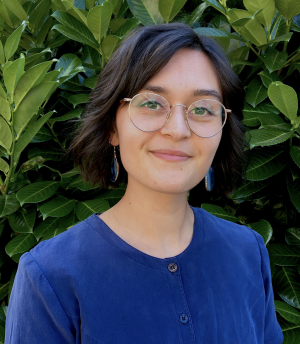
Anthropology and Biological Science; Mentors - Jerry DeSilva and Mark McPeek
Klara is an evolutionary anthropologist whose research focuses on skeletal shape variation in our extinct human relatives. Using quantitative genetics, a computational method derived from evolutionary biology, she investigates the evolutionary forces that shaped this diversity as our ancestors started walking upright and populating the world. As a Neukom Fellow, she will reconstruct the evolutionary forces that contributed to the diversification of our closest extinct relatives, members of the genus Homo. This genus encompasses a broad range of species, some more similar to modern humans than others, but their evolutionary history is unresolved. Klara will shed light on how these extinct relatives diversified as they evolved in Africa and dispersed to the rest of the world.
Klara Komza
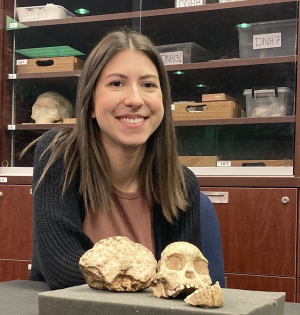
Cognitive Science and Computer Science; Mentors - Luke Chang, Jonathan Phillips, Soroush Vosoughi, SouYoung Jin
Dae Houlihan
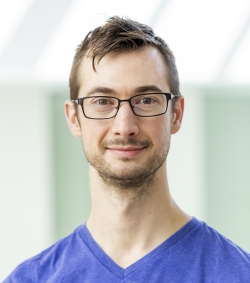
Dae studies the cognitive mechanisms of emotional intelligence. On one hand, human social cognition shows astounding flexibility and sophistication. On the other hand, it shows dramatic biases and limitations. Dae's work adopts an approach of "analysis by synthesis," building computational models to investigate how people accomplish the remarkable cognitive feats involved in everyday social interactions. He uses probabilistic programs and machine learning to model how social cognition works, when it is effective, and why it fails. By reverse-engineering human social cognition, his work also points towards how we might—and how we should not—build emotionally intelligent machines.
Biology Sciences and Geography; Mentors: Caitlin Hicks Pries and Justin Mankin
Sophie von Fromm
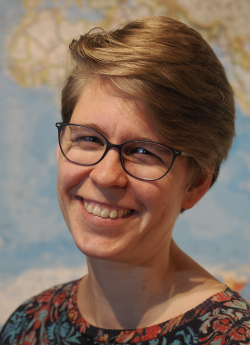
Sophie is a terrestrial biogeochemist. Her research focuses on the vulnerability of soil organic carbon to climate and land use change. During her PhD, she investigated factors and processes controlling soil organic carbon storage and persistence in Afrotropical soils. She also contributed to the development and maintenance of the International Soil Radiocarbon Database (ISRaD), which allows the study of soil organic carbon persistence at the global scale. As a Neukom Fellow, Sophie is improving the predictive power and accuracy of existing soil models for sub-Saharan Africa. She is passionate about rowing and loves to spend her free time outdoors.